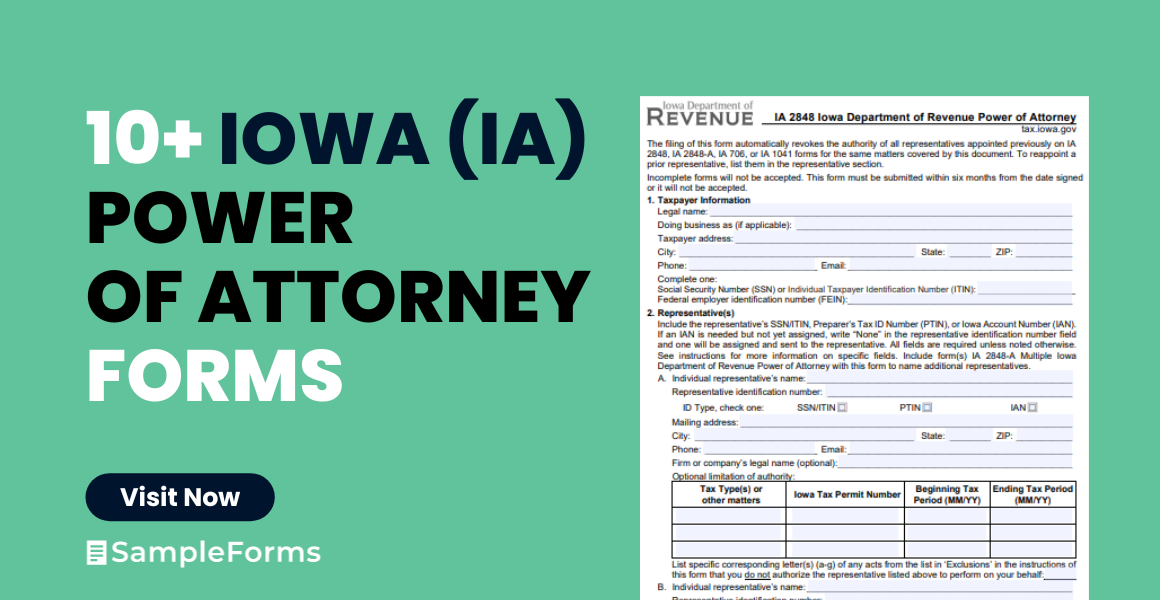Navigating the complexities of an Iowa Power of Attorney form is crucial for effective legal empowerment. This guide offers essential tips and step-by-step instructions to ensure your form is legally compliant and reflects your intentions accurately. Whether for financial, healthcare, or general affairs, understanding the nuances of Iowa’s legal requirements is key. Our expert advice simplifies the process, providing peace of mind and clarity in delegating authority responsibly in Iowa.
What is the Iowa Power of Attorney Form?
The Iowa Power of Attorney Form is a legal document that allows an individual, known as the principal, to designate another person, called the agent or attorney-in-fact, to make decisions and take actions on their behalf. This form is used in Iowa to handle affairs like finances, health care, or property management when the principal is unable or prefers not to manage these matters personally.
What is the Best Sample Iowa Power of Attorney Form?
Below is a sample Iowa Power of Attorney form with fillable blanks. Please note that this is a basic template and should be customized to fit specific legal requirements and personal circumstances. It’s advisable to consult with a legal professional for a comprehensive and legally binding document.
IOWA POWER OF ATTORNEY FORM
Principal’s Information:
- Name: _________________
- Address: _________________
- Phone Number: _________________
Agent’s Information:
- Name: _________________
- Address: _________________
- Phone Number: _________________
Powers Granted (check applicable powers):
- Financial Decisions
- Real Estate Management
- Personal and Family Maintenance
- Business Operations
- Health Care Decisions
- Other: _________________
Special Instructions:
Effective Date:
- This Power of Attorney shall become effective on (date) _________________.
Duration:
- Durable (remains in effect if I become incapacitated)
- Non-Durable (ends if I become incapacitated)
- Springing (becomes effective upon a specified event or condition)
Governing Law:
- This document will be governed by the laws of the State of Iowa.
Principal’s Signature:
- Signature: _________________
- Date: _________________
Agent’s Acknowledgment:
- I, _________________, accept the appointment as an agent and agree to act in the principal’s best interest to the best of my ability.
- Signature: _________________
- Date: _________________
Notarization (if required):
- State of Iowa, County of _________________
- On _________________, before me, _________________ (Notary Public), personally appeared _________________, known to me (or satisfactorily proven) to be the person whose name is subscribed to the within instrument and acknowledged that they executed the same for the purposes therein contained.
- In witness whereof, I hereunto set my hand and official seal.
- Notary Public: _________________
- My Commission Expires: _________________
1. Iowa Statutory Power of Attorney Form
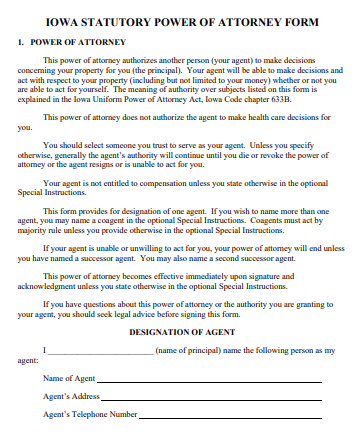
2. Iowa Special Power of Attorney Form
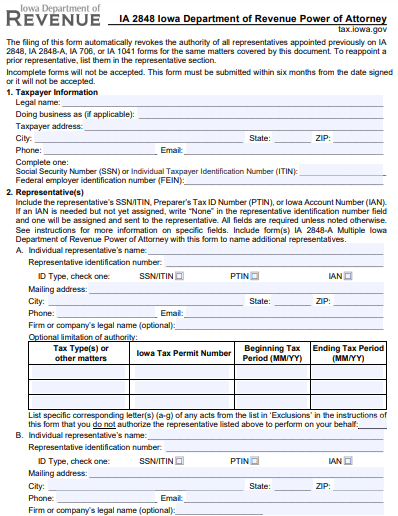
3. Iowa Sample Power of Attorney Form
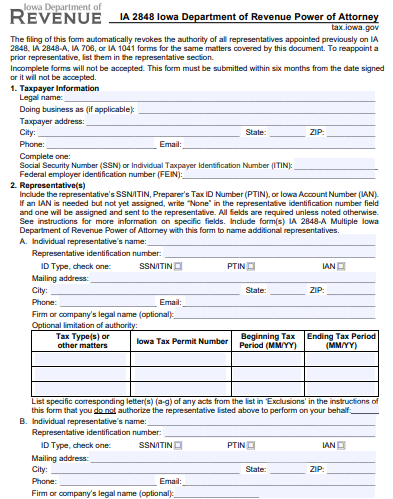
4. Iowa Printable Power of Attorney Form
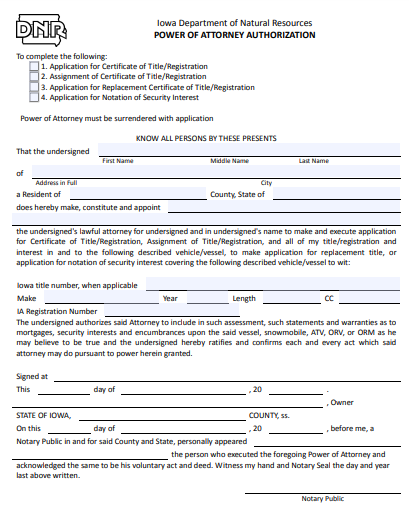
5. Iowa Power of Attorney Form
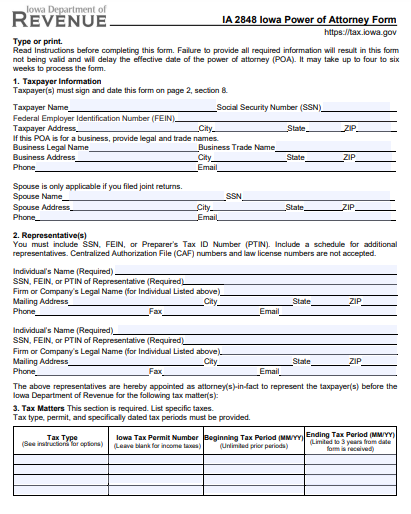
6. Iowa Power of Attorney Form for Minor Child
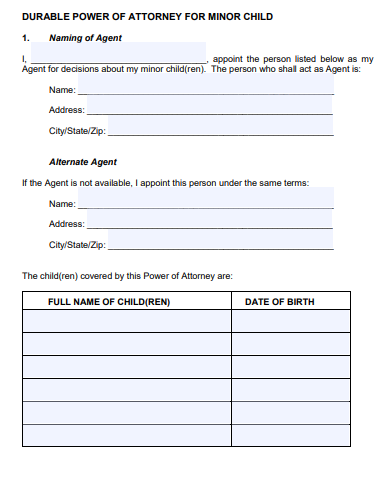
7. Iowa Health Care Power of Attorney Form
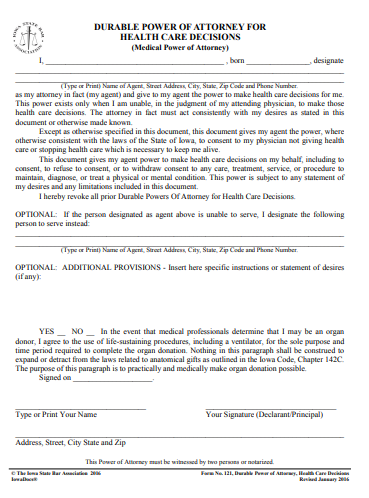
8. Iowa General Power of Attorney Form
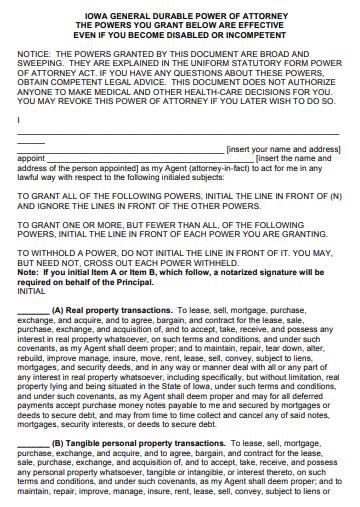
9. Iowa Financial Power of Attorney Form
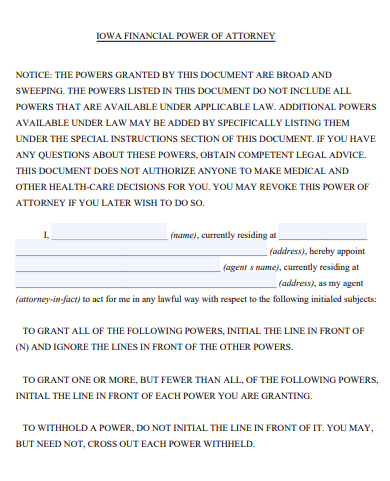
10. Iowa Durable Power of Attorney Form
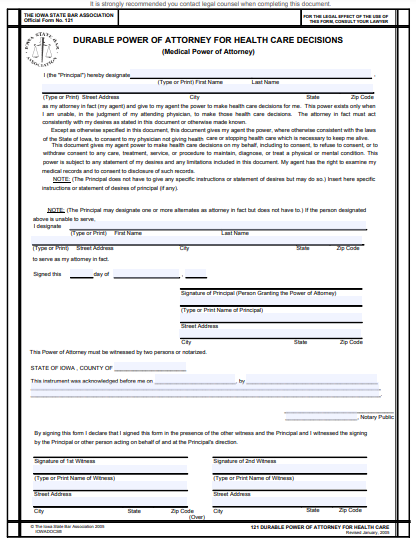
11. Iowa Blank Power of Attorney Form
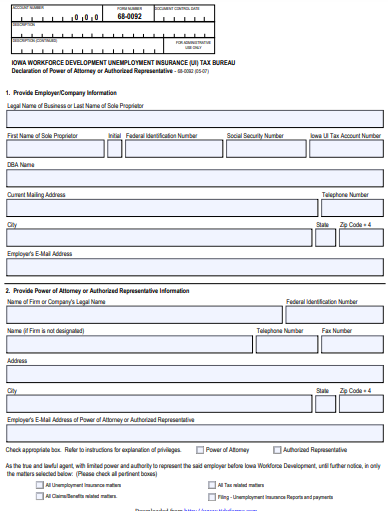
What is Iowa’s Secure Power of Attorney?
Iowa’s Secure Power of Attorney (POA) is a legal document granting a trusted individual authority to handle specific tasks, often related to property or vehicle transactions. This form ensures secure and authorized dealings, especially when the principal cannot be present. It’s commonly used in vehicle sales, transfers, and registrations, providing a safeguarded way to manage these transactions.
Examples:
- Vehicle Sale: Authorizing an agent to sell a car on your behalf.
- Title Transfer: Enabling an agent to handle vehicle title transfers.
- Registration: Allowing an agent to register a vehicle in Iowa.
- Dealing with DMV: Authorizing someone to represent you at the DMV.
- Handling Loans: Managing vehicle-related loans through an agent.
What is the Power of Attorney Form for the Iowa Title?
The Power of Attorney form for the Iowa title is a legal document used to grant someone else the authority to handle matters related to property titles in Iowa. This is particularly useful in real estate transactions, where the agent can sign documents, manage sales, or handle title transfers on behalf of the principal.
Examples:
- Real Estate Sales: Signing sales documents for property transactions.
- Title Transfers: Managing the transfer of property titles.
- Refinancing: Assisting in refinancing property loans.
- Leasing Property: Handling lease agreements and negotiations.
- Estate Management: Managing estate-related title issues.
How Long is a Power of Attorney Good for in Iowa?
In Iowa, the duration of a Power of Attorney depends on the type chosen. A Durable Power of Attorney remains valid even if the principal becomes incapacitated, while a Non-Durable Power of Attorney ends upon the principal’s incapacity. Unless otherwise specified, a POA lasts until the principal’s death or revocation.
Examples:
- Durable POA: Remains effective despite principal’s incapacity.
- Non-Durable POA: Ends when the principal becomes incapacitated.
- Limited POA: Valid for a specified task or time period.
- Springing POA: Activates upon a certain event or condition.
- Revocation: Ends when the principal revokes it in writing.
How Do I Get a Durable Power of Attorney in Iowa?
To obtain a Durable Power of Attorney in Iowa, select a form that specifies durability, ensuring it remains effective even if you become incapacitated. Fill out the form, clearly defining the powers granted. Have it signed and notarized for legal validity. Consulting a legal expert is recommended for accuracy and compliance with Iowa laws.
Examples:
- Healthcare Decisions: Assigning someone to make medical decisions.
- Financial Management: Authorizing management of financial affairs.
- Real Estate Transactions: Handling property-related matters.
- Personal Affairs: Managing personal and family matters.
- Business Operations: Overseeing business-related decisions.
What is a Power of Attorney for a Minor Child in Iowa?
A Power of Attorney for a minor child in Iowa is a legal document that allows a parent to grant another adult the authority to make decisions and take care of their child for a temporary period. This is useful in situations where the parent is unable to care for the child due to absence, illness, or other reasons.
Examples:
- Temporary Care: Assigning someone to care for your child during a trip.
- Medical Decisions: Authorizing medical treatment in your absence.
- Educational Matters: Handling school-related decisions.
- Everyday Activities: Managing daily activities and needs.
- Emergency Situations: Making urgent decisions when parents are unavailable.
How Do I Get a Power of Attorney in Iowa?
Obtaining a Power of Attorney in Iowa involves a clear, legal process. Start by selecting a trusted individual as your agent. Use a state-specific form to outline the powers granted. Ensure the document meets Iowa legal standards, including signatures and notarization. It’s crucial to understand the responsibilities and limitations of the role. Consulting a legal expert can provide additional clarity and legal validity to the process.
1. Consult a Legal Professional
- Engage with an attorney to understand Iowa’s legal requirements for a Power of Attorney, ensuring your document is valid and comprehensive.
2. Choose a Reliable Agent
- Select someone you trust implicitly to act in your best interests, as this person will have significant authority over your affairs.
3. Use an Iowa-Specific Form
- Utilize a form tailored to Iowa’s laws to guarantee all legal bases are covered, including state-specific clauses and stipulations.
4. Clearly Define Powers
- Specify the exact powers granted to your agent, whether for financial decisions, healthcare, or property management, to avoid ambiguity.
5. Notarize the Document
- Have the Power of Attorney form notarized in Iowa, as this step often adds a layer of legal authenticity and is required in many cases.
What is the difference between guardianship and power of attorney in Iowa?
| Aspect | Guardianship in Iowa | Power of Attorney in Iowa |
|---|---|---|
| Legal Authority | Court-appointed responsibility for an individual’s personal and financial decisions, typically for minors or adults unable to make decisions for themselves. | Voluntarily granted authority to another individual to make specific decisions, often financial or healthcare-related. |
| Establishment Process | Involves a court process where a judge determines the necessity of guardianship based on evidence and testimony. | Established through a legal document where the principal voluntarily assigns powers to an agent. |
| Duration | Generally long-term, often until the ward is no longer incapacitated or reaches adulthood. | Can be durable, non-durable, or springing, depending on the type and terms set by the principal. |
| Decision-Making Scope | Broad, covering a wide range of personal and financial decisions as determined by the court. | Limited to specific areas as outlined in the Power of Attorney document, such as financial management or healthcare decisions. |
| Revocation | Can only be altered or terminated by a court order. | Can be revoked by the principal at any time, as long as they are mentally competent. |
| Court Oversight | Regular court supervision and reporting are required to ensure the ward’s best interests are being met. | No court oversight unless specifically required; operates primarily on the terms set in the document. |
| Initiation | Often initiated by a family member, friend, or state agency when an individual is deemed incapable of managing their own affairs. | Initiated by the individual (principal) while they are still capable of making decisions. |
This table outlines the key differences between guardianship and power of attorney in Iowa, highlighting the distinct legal frameworks and implications of each.
How to Prepare an Iowa Power of Attorney Form
Preparing an Iowa Power of Attorney (POA) form is a significant step in managing your affairs. This guide provides a clear, step-by-step approach to ensure your POA is effective, legally compliant, and tailored to your needs.
Step 1: Understand the Purpose
- Begin by understanding what a Power of Attorney is and how it can be used in Iowa. This legal document allows you to appoint someone to make decisions on your behalf.
Step 2: Choose the Right Type of POA
- Decide whether you need a General, Limited, Durable, or Healthcare POA, each serving different purposes. A Durable POA, for instance, remains effective if you become incapacitated.
Step 3: Select a Trusted Agent
- Choose someone you trust implicitly to act as your agent. This person should be reliable, willing, and capable of making decisions that align with your best interests.
Step 4: Use a State-Specific Form
- Obtain an Iowa-specific POA form to ensure compliance with state laws. These forms can be found online or through a legal professional.
Step 5: Define the Powers Clearly
- Clearly outline the powers you are granting. Be specific about what your agent can and cannot do, and under what circumstances these powers will apply.
Step 6: Fill Out the Form
- Complete the form with accurate details. Include your full name, address, the agent’s details, and the specific powers granted.
Step 7: Review Legal Requirements
- Ensure your POA meets all Iowa legal requirements. This may include having witnesses or getting the document notarized, depending on the type of POA.
Step 8: Sign and Notarize
- Sign the document in the presence of a notary public. This step often adds legal validity and is required for certain types of POA in Iowa.
Step 9: Distribute Copies
- Provide copies of the signed POA to your agent and any relevant institutions, such as banks or healthcare providers.
Step 10: Regularly Review and Update
- Regularly review your POA to ensure it remains up-to-date with your current wishes and circumstances. Update it as needed.
By following these steps, you can create an effective and legally sound Iowa Power of Attorney form, ensuring your affairs are managed according to your preferences. Remember, consulting with a legal expert can provide additional assurance and guidance in this process.
Tips for Using an Effective Iowa Power of Attorney Form
To ensure your Iowa Power of Attorney form is effective and serves its intended purpose, consider these tips:
- Communicate with Your Agent: Discuss your wishes and expectations with your agent. Clear communication is key to effective decision-making.
- Be Specific in Powers Granted: Avoid vague language. Clearly outline the scope and limitations of the powers granted.
- Consider a Springing POA: If you prefer the POA to become effective only under certain conditions, like incapacitation, opt for a springing POA.
- Legal Consultation: Consult with a legal expert to ensure your POA adheres to Iowa laws and accurately reflects your intentions.
- Inform Relevant Parties: Notify family members, financial institutions, and healthcare providers about the POA and provide them with copies if necessary.
- Review for Compliance: Regularly review the POA for compliance with current Iowa laws, as legal requirements may change.
- Revoke When Necessary: If circumstances change, such as a change in your relationship with the agent, revoke the POA and create a new one if needed.
By following these steps and tips, you can create and use an Iowa Power of Attorney form effectively, ensuring your affairs are handled as per your wishes.
How Can I Get Power of Attorney in Iowa?
To get a Power of Attorney in Iowa, choose a trusted agent, fill out an Iowa-specific POA form, and ensure it’s legally signed and notarized.
Why Should I Have an Iowa PoA?
Having an Iowa PoA ensures your affairs are managed according to your wishes, especially during times when you’re unable to make decisions yourself.
Do I Need to Hire an Attorney for My Iowa PoA?
While not mandatory, hiring an attorney for your Iowa PoA can ensure legal accuracy and compliance with state-specific regulations.
How Much Would I Typically Have to Pay to Get a Power of Attorney Form in Iowa?
The cost for a Power of Attorney form in Iowa varies, typically ranging from free DIY forms to attorney fees of several hundred dollars.
What Should Happen After I Have Made an Iowa Power of Attorney?
After creating an Iowa Power of Attorney, distribute copies to relevant parties, inform your agent, and store the original document safely. Regularly review and update it as needed.
In summary, our guide on creating an Iowa Power of Attorney Form provides a clear roadmap for legally delegating authority. By carefully selecting an agent and outlining specific powers, you can ensure your affairs are managed as per your wishes. Regular reviews and updates are essential for maintaining its relevance and effectiveness, safeguarding your interests in Iowa.
Related Posts
-
10+ Free New Hampshire (NH) Power of Attorney Form Download – How to Create Guide, Tips
-
10+ Free Nevada (NV) Power of Attorney Form Download – How to Create Guide, Tips
-
10+ Free Nebraska (NE) Power of Attorney Form Download – How to Create Guide, Tips
-
10+ Free Montana (MT) Power of Attorney Form Download – How to Create Guide, Tips
-
10+ Free Missouri (MO) Power of Attorney Form Download – How to Create Guide, Tips
-
10+ Free Minnesota (MN) Power of Attorney Form Download – How to Create Guide, Tips
-
10+ Free Mississippi (MS) Power of Attorney Form Download – How to Create Guide, Tips
-
10+ Free Massachusetts (MA) Power of Attorney Form Download – How to Create Guide, Tips
-
10+ Free Maryland (MD) Power of Attorney Form Download – How to Create Guide, Tips
-
10+ Free Maine (ME) Power of Attorney Form Download – How to Create Guide, Tips
-
10+ Free Louisiana (LA) Power of Attorney Form Download – How to Create Guide, Tips
-
10+ Free Kentucky (KY) Power of Attorney Form Download – How to Create Guide, Tips
-
10+ Free Kansas (KS) Power of Attorney Form Download – How to Create Guide, Tips
-
10+ Free Indiana (IN) Power of Attorney Form Download – How to Create Guide, Tips
-
10+ Free Illinois (IL) Power of Attorney Form Download – How to Create Guide, Tips
